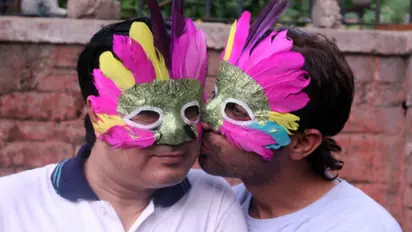
The supposed flagbearer of Hindutva in India — BJP and the Narendra Modi government — that speaks the language of economic development and that is castigated as conservative and regressive, has done what was not expected of it. Whatever be the personal views of the leaders in this dispensation, the government has decided to withdraw from citizens' bedrooms.
The government in its reply to the Supreme Court left it to the five constitutional experts on the bench of the apex court to do what they wanted with the constitutionality of the over 150-year old archaic colonial law — Section 377 of IPC — that criminalises gay liaison as much as it may put heterosexual couples in trouble, as the law does not specify the sexual orientation to which it applies. ‘Do what you deem fit’, is the government’s message to the highest court.
Chief Justice of India Dipak Mishra, who has suffered the wrath of a section of his community and opposition parties is the one who is presiding over the matter in Supreme Court.
Clearly, the ‘conservatives’ have taken the lead in paving the way for decriminalising homosexuality in perhaps a throwback to the good old ‘liberal days’ when India produced the masterpiece treatise on sex and sexuality, Kamasutra, authored by Vatsyayana, a Hindu rishi.
The first decisive sign of a thought churn on the issue was reflected in the bold stand taken by Rashtriya Swayamsevak Sangh’s (RSS) influential joint general secretary Dattatreya Hosabale on the platform of a media outlet in 2016. He had muddied the waters when he said RSS “did not” believe that homosexuality was a crime, underlining individual personal freedom in matters so private as sexuality.
“Why should the RSS have an opinion on homosexuality? It is not a crime as long as it does not affect the lives of others. Sexual preferences are personal issues,” Hosabale had said.
Arun Jaitley had supported decriminalising homosexuality, at the cost of making an adverse commentary on the 2013 Supreme Court verdict banning gay sex. Speaking at a media platform he had said that it was “not in accordance with evolving legal jurisprudence” and that the court needed to reconsider it.
In 2017 speaking at the 13th Nehru Memorial Lecture at JNU, Hindu spiritual leader Sri Sri Ravi Shankar had responded to a student’s query, saying that homosexuality was not a sickness, rather just a tendency, which he had claimed changed. He had also said that he had witnessed homosexuals becoming straight and vice-versa. “If you stand up, nobody can insult you…”
While India is one among 70 countries in the world where homosexuality is still a criminal offence, the voices of protest have reached a crescendo and the political atmosphere too seems poised for the much-wanted switch to individual liberty.